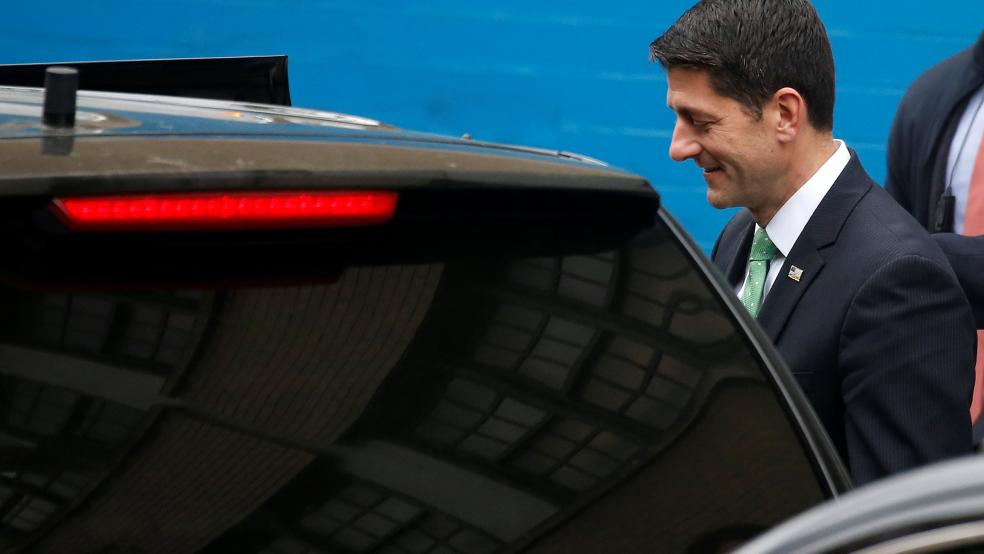House Speaker Paul Ryan wants to turn Congress into an ideas factory for the Republican Party in order to create a black-and-white contrast with Democrats in a contentious election year. But first he may have to overcome an unexpected obstacle: Senate Majority Leader Mitch McConnell.
On the surface, the two veteran lawmakers have a cordial relationship. They have gone out of their way to praise each other in the media and share an important idea when it comes to governing, namely that government shutdowns don’t do anyone much good.
Related: Conservatives Tell Paul Ryan, the Honeymoon’s Over!
But in the early days of the new session of Congress, a split has begun to emerge between Ryan’s idealistic rhetoric and McConnell’s hard-nosed reality, which is shaped by the fact that control of the Senate is up for grabs in November.
Starting Wednesday, congressional Republicans will meet for a three-day summit in Baltimore to hammer out their agenda for 2016. The retreat will either get lawmakers singing off the same sheet of music or turn hairline cracks into major rifts.
Here’s where Ryan and McConnell may be headed for conflict:
1. Authorization for the use of military force. Last week Ryan tapped House Foreign Affairs Committee chair Ed Royce (R-CA) to begin holding listening sessions with members to gauge support for an authorization for the use of military force (AUMF) that would specifically target the Islamic State.
Related: Why Congress Will Get Even Less Done in 2016
President Obama, who has argued that war powers resolutions from 2001 and 2003 give him the authority fight the terror network, sent a draft AUMF to Capitol Hill about a year ago. It was declared dead on arrival and since then the issue has floundered, with occasional long-shot attempts by Republicans and Democrats alike to get the debate going again.
Ryan’s legislative move rekindled optimism that Congress might actually do something to authorize the conflict that began in 2014.
But this weekend McConnell said the issue was a non-starter in his chamber.
“I think an AUMF, an authorization to use military force, that ties the president's hands behind his back is not something I would want to do to a new president who's going to have to clean up this mess,” he said during an interview on ABC’s This Week.
2. Legislative goals. Despite an abbreviated congressional calendar in 2016 thanks to the presidential election, Ryan has signaled he wants to tackle some major issues, including criminal justice reform in the next six months.
Related: Why Congress Is Throwing in the Towel on Tax Reform
He has also talked about taking action on welfare reform and this weekend hosted a forum in South Carolina to focus on an issue that has been given short shrift on Capitol Hill and the presidential campaign trail: poverty.
But when McConnell was asked in the interview on This Week what the “most important piece of legislation you could put on the president's desk this year,” he lowered the bar substantially.
Admitting it “may be a little boring to the public,” the Kentucky Republican said it would be passing the 12 appropriations bill that fund the federal government.
Ryan, too, has said he would like to approve the dozen measures individually and avoid the end-of-year drama of having to cobble together a must-pass omnibus spending bill, but it’s been an item on a much larger to-do list, not the goal of the year.
McConnell’s answer likely reflects a political calculation on his part, as he worries that the specter of a government shutdown will make voters think the GOP can’t govern.
3. TPP. With the end of the 90 day period for public and congressional review of the Trans-Pacific Partnership rapidly approaching, many are wondering if Capitol Hill will move on the sweeping trade deal in 2016.
Ryan is on the fence about the agreement and has fended off questions about his stance with jokes about how he still needs to read the agreement’s thousands of pages before he makes up his mind.
McConnell, however, has indicated he is in no rush to take up the deal, noting its unpopularity among White House hopefuls from both parties. He could decide to hold off until after the election, during a lame duck session of Congress, before giving the deal a vote.





